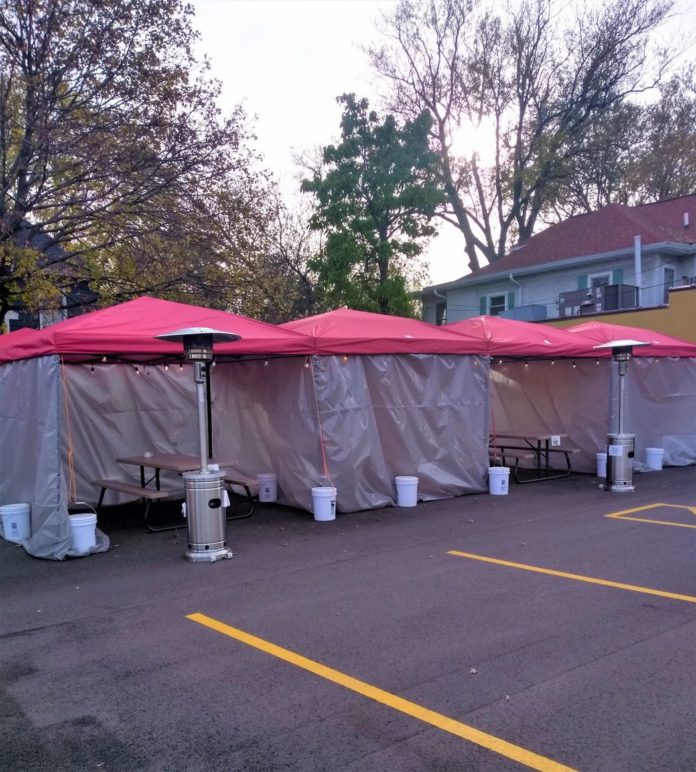When the temperatures started to drop, Daisy Cafe & Cupcakery manager Kelly Knocke said the Atwood Avenue restaurant was anxious about how it would seat its guests in the elements.
The cafe is one of several Madison businesses that had worked with the city’s Streatery Program to set up outdoor seating for customers during the summer months. In fact, Knocke said without the city’s outdoor dining program, Daisy Cafe may not have come this far in surviving the pandemic.
The city created the Streatery Program under an emergency order to temporarily allow restaurants to expand their business footprint onto the public rights-of-way or in privately owned parking lots upon approval. It also includes expanded alcohol licenses or waived fees, but no money for equipment, for example.
The program, which covers all 77 square miles of Madison, has been extended to April 14. The winter months pose both an opportunity and a challenge for restaurants and taverns to serve patrons by acquiring heaters, putting up tents or even installing igloos for customers to dine-in while meeting local capacity limits.
“We’ve had a very robust outdoor dining program in Madison for decades, and this extension and need to be outside and extend their season is just so much more imperative right now than it has been in the past,” Street Vending Coordinator Meghan Blake-Horst said. “In Madison and Dane County, bars are at zero capacity inside so outside is their only option, and restaurants, 25 percent inside is not enough to break even, so they need the additional seating outside to at least break even or come closer.”
She added that usually, businesses would pack up and head indoors after the last farmers market of the season.
Daisy Cafe & Cupcakery had paved its parking lot this summer to seat diners comfortably, Knocke said. When the chill of autumn crept onto the isthmus, staff got to work brainstorming ideas for cold weather dining.
“Our first plan was the heaters, because there was still some sunshine coming down and a lot of our guests wanted to still sit in the sunshine,” she said. “As far as the tents go, we were trying to find a way for people to be able to sit together away from the next table and keep that heat from the heater inside with them.”
One large tent posed challenges. If walls are around it, the health department would classify it as an indoor dining facility and limit the capacity to 25 percent. After weighing the costs of tents and heaters with the risk of a Wisconsin winter, Daisy Cafe decided on smaller, individual tents — “heated dining dens.”
“We decided on the smaller tents and the standing propane heaters because they were more flexible, we had options in case they didn’t work in the original setup or in case we had to change things for health or fire department reasons,” Knocke said.
But the cafe has already lost a small battle with Wisconsin’s elements — a strong wind that blew over the dens. Knocke said they’re currently working on securing the tents to withstand any upcoming gusty days.
When asked why this type of program didn’t exist prior to the pandemic, Blake-Horst said businesses have never asked for it before.
“In almost five years in this position, nobody has ever said ‘Hey Meghan, can I have a heater out, I’d like to look into that.’ So we haven’t,” she said, adding that the current guidelines also allow for greater flexibility for things that weren’t allowable in the past — turning a no into a yes for businesses looking at tents, propane or other heating sources. Blake-Horst’s role has been to work with the restaurant operators to try to match their visions with reality.
Cold weather dining plans have been a collaborative effort. Blake-Horst said that when Madison started having the “winter conversation,” the team joined in phone calls with cities across the U.S. from Portland to Sun Prairie and even into Canada.
“Everyone north of Atlanta is grappling with this,” she said. But with that, comes a high demand for equipment. Blake-Horst noted a backorder for heaters. With the pandemic keeping people at home, the general public is buying out heaters that restaurants are after. She added that over the summer, there was also a backorder for curb stops, delineators and fencing.
For Daisy Cafe & Cupcakery, Knocke said outdoor dining is likely to continue regardless of a pandemic due to neighborhood support and that neighborhood support is what will get them through the winter.
“We’re going into the time of year where we struggle normally year to year, and this year is going to be even harder,” she said. If customers want to keep their local, small neighborhood establishments around, Knocke said eating at or ordering from the cafe is going to be key for the restaurant to stay open.
She said local grant programs and the Paycheck Protection Program loans have been a buoy for Daisy Cafe. Knocke called for more of that for small businesses and more oversight to ensure the small businesses who need the money, get the money.
“The Streatery Program I think really saved quite a few restaurants here,” she continued. “I think in the end, the local city just saying ‘go ahead’ has been the best thing for us and if we can continue that, I think that’s going to be where we’re still at in spring. Unless a vaccine does come along quickly come March, we’re going to need the Streatery Program still.”
Blake-Horst said she’s “carefully optimistic” for Madison’s eatery scene.
“I do understand the reality of the dollars and the business owners are struggling and they need cash in their pockets to be able to pay their employees, pay all of their overhead, pay rent,” she said. “Over the winter, I know we’re going to see a lot of hibernation at least of business owners that either don’t have the space to get the capacity, the numbers they need or the elements just take over. Looking at what that looks like in the spring will have a very interesting story to tell.”
The Streatery Program team will review the program this winter to review what worked and what didn’t since early April and reach out to restaurant owners for feedback.
Read the current Dane County order: https://publichealthmdc.com/documents/2020-09-01_Order_9amendment.pdf
Read the lastest Streatery guidelines: https://www.cityofmadison.com/dpced/economicdevelopment/coronavirus-covid-19/173/
-By Stephanie Hoff
WisBusiness.com






